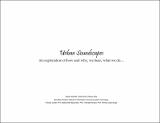Please use this identifier to cite or link to this item:
http://drsr.daiict.ac.in//handle/123456789/225Full metadata record
| DC Field | Value | Language |
|---|---|---|
| dc.contributor.advisor | Mazumdar, Madhumita | |
| dc.contributor.author | Kadam, Neha | |
| dc.date.accessioned | 2017-06-10T14:37:40Z | |
| dc.date.available | 2017-06-10T14:37:40Z | |
| dc.date.issued | 2008 | |
| dc.identifier.citation | Kadam, Neha (2008). Urban soundscapes : an exploration of why and how, we hear, what we do.... Dhirubhai Ambani Institute of Information and Communication Technology, 49 p. (Acc.No: T00188) | |
| dc.identifier.uri | http://drsr.daiict.ac.in/handle/123456789/225 | |
| dc.description.abstract | Urban soundscapes is a multimedia exploration of the forms, practices and habits of engaging with sound in a contemporary urban Indian context. It focuses on the listening habits of a section of the urban Indian youth and invites critical reflection on the choices they make in the selection and enjoyment of the sounds that come to them through the mediation modern technology. Put simply, Urban Soundscapes is both an exploration and reflection on why we hear what we do as we live our lives in the complex sonic environment of the modern city. It begins on the premise that the urban soundscape is not a random collection of sounds. Sounds in the city come in forms, patterns, designs and shapes that are tied to dominant economic structures and local cultural contexts. It invites the user to explore this observation through four different points of entry through technology, through the consumer, the music market and of course through the makers of music themselves. The role of technology in creating a complex and evolving urban soundscape is underscored by a focus on the particular forms, tastes, and habits of listening to music by a dominant section of the urban Indian youth. Based on both fieldwork and academic writings on the subject, this product tries to present a complex cultural and social phenomenon in a format that tries to appeal to both the initiated and informed. It can in a sense position itself as educational software that tries to complement serious writing on the subject by putting together the constitutive elements of multi‐media on a digital medium that is both attractive and affordable. It does not in any way pretend to be either a comprehensive or definitive work on the subject. It offers instead the possibility of generating a critical awareness of one’s social and cultural context in a way that is both intelligible and entertaining. | |
| dc.publisher | Dhirubhai Ambani Institute of Information and Communication Technology | |
| dc.subject | Cities and towns | |
| dc.subject | Urbanization | |
| dc.subject | City and town life | |
| dc.subject | Soundscapes Folk music | |
| dc.subject | India | |
| dc.subject | History and criticism | |
| dc.subject | Music and globalization | |
| dc.subject | Finland | |
| dc.subject | Sounds in literature | |
| dc.subject | Sound | |
| dc.subject | Recording and reproducing | |
| dc.subject | Great Britain | |
| dc.subject | History | |
| dc.subject | 19th century | |
| dc.subject | Speech in literature | |
| dc.subject | Sound in literature | |
| dc.subject | Voice in literature | |
| dc.subject | City and town life in motion pictures | |
| dc.subject | Music | |
| dc.subject | 21st century | |
| dc.subject | History and criticism | |
| dc.subject | Music and technology | |
| dc.subject | Popular culture | |
| dc.subject | 21st century | |
| dc.classification.ddc | 306.4842 KAD | |
| dc.title | Urban soundscapes: an exploration of why and how, we hear, what we do... | |
| dc.type | Project Report | |
| dc.degree | M. Des | |
| dc.student.id | 200614004 | |
| dc.accession.number | T00188 | |
| Appears in Collections: | M Des Project Reports | |
Files in This Item:
| File | Description | Size | Format | |
|---|---|---|---|---|
| 200614004.pdf Restricted Access | 2.15 MB | Adobe PDF |  View/Open Request a copy |
Items in DSpace are protected by copyright, with all rights reserved, unless otherwise indicated.
